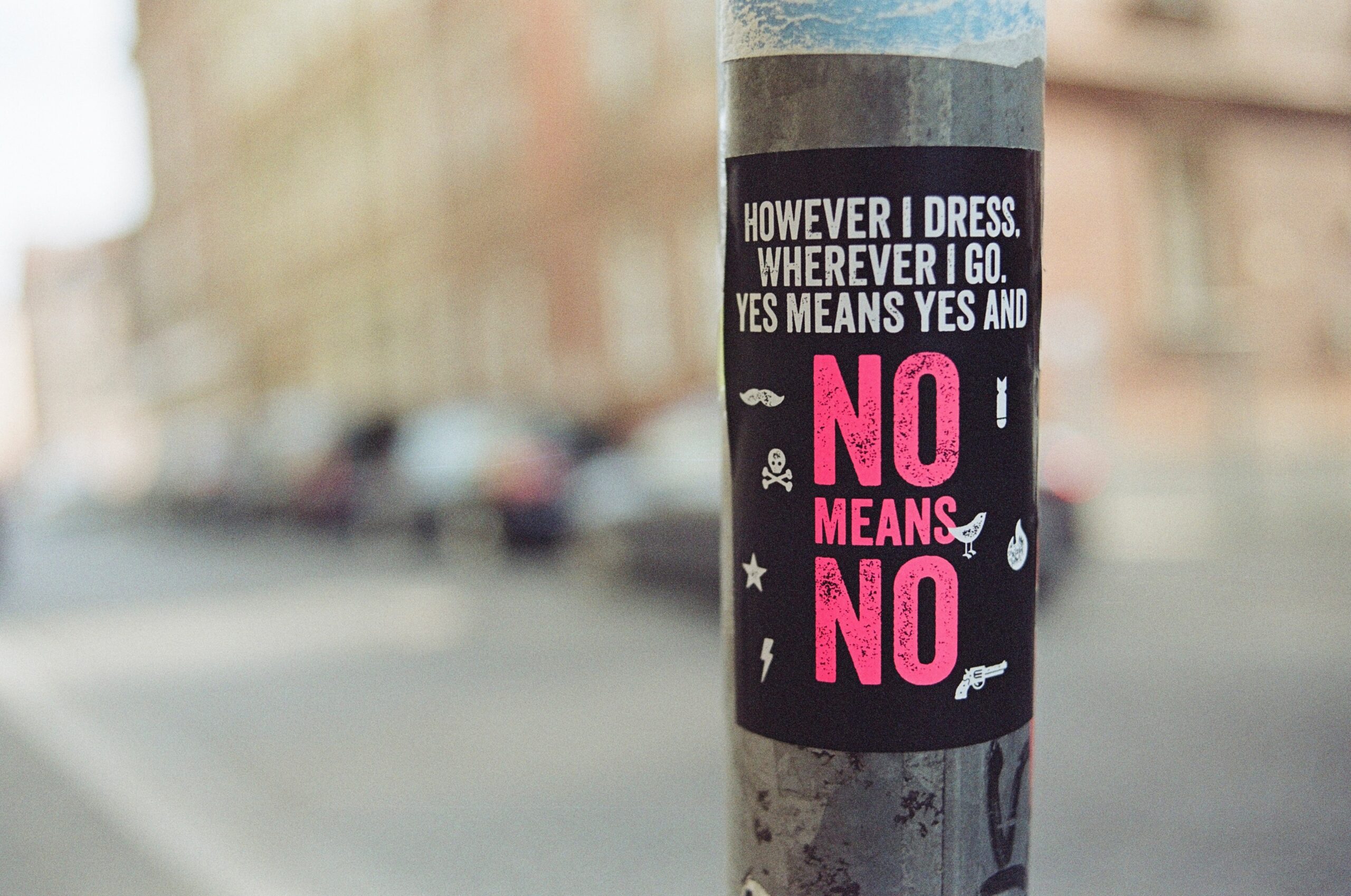Rape culture is the normalization of behaviors and environments that enable sexual assault and rape. This April, during Sexual Assault Awareness Month, it’s important that we focus on rape culture and how it influences the acceptance or normalization of sexual assault.
When I was entering college – and even during some of my high school events – I had some rules drilled into my brain:
- Don’t ever walk alone at night.
- Always carry pepper spray. If you don’t have pepper spray, carry your car keys between your fingers.
- Be aware of where all of the streetlights are.
- When you get into your car at night, glance underneath the car in case someone was hiding underneath. Always check the backseat.
- Never walk alone with headphones in.
- Watch your drinks.
A lot of my male friends and the men I’m around in my daily life don’t understand what I mean when I say “rape culture.” They haven’t been told countless times to not go out alone or to make sure they don’t leave their drink unattended for even a minute. They aren’t usually scolded for wearing clothing that is “too revealing” when they’re just wearing shorts or a skirt.
This is because we live in a culture that focuses on “harm reduction” rather than stopping the issue at the source. We place blame on the victim for not being smart enough to avoid being raped – rather than condemning rape altogether. People blame victims to distance themselves from an unpleasant occurrence and thereby confirm their own invulnerability to the risk. By labeling or accusing the victim, others can see the victim as different from themselves. People reassure themselves by thinking, “Because I am not like her, because I do not do that, this would never happen to me.”
Rape culture impacts men negatively too. Girls can take advantage of guys just as much as guys can. Actually, because of rape culture and our societies tendency to associate sex with masculinity, men rarely associate being taken advantage of by a girl as a “bad thing” – even if it makes them uncomfortable. For example, it’s common to hear a man talk about his first sexual experience being with someone several years older than him while he was still a young teenager. Or when a female teacher sexually assaults a student – it’s often taken less seriously in media.
No, men don’t typically experience the same fear as women when walking at night. However, men experience a different obstacle just as much as women do: being told their feelings of being violated are invalid. Oftentimes, this culture causes men to stay silent after engaging in sexual activity against their will.

The impact of rape culture is even more prevalent on college campuses. There is a direct correlation between college campuses and rape frequency. According to RAINN, 1 in 5 women will be sexually assaulted by the time they finish college, while 1 in 16 men will be sexually assaulted by the time they finish college. This statistic demonstrates how the setting of a college campus enables this harmful behavior.
This culture is highlighted throughout college, but specifically Greek life and fraternities. Greek life’s role in rape culture is certainly a prominent one. According to a 2019 study published by Sage Journals, fraternity members are three times more likely than nonmembers to rape someone. This is largely in part because observers (other fraternity brothers) were less likely to hold fraternity members accountable for sexual assault. Thus, the culture of protection appears to apply to fraternity members because they are “protected” by being perceived as less responsible for sexual assault, and their victims perceived as more responsible, than nonmembers. But the harmful effects of rape culture appear in college environments beyond just fraternities.
According to RAINN, most college-age victims do not report sexual violence on campus. This is especially the case for college-age women. Only about 20% of female college students report sexual assaults to authorities. The reasons college women may decide not to report assaults include embarrassment and fear the crime will happen again. Like women, male victims report sexual assault at low rates, potentially due to shame, humiliation, or the stigma surrounding men being vulnerable. In most sexual assault cases, the perpetrator is either a family member, an acquaintance, or someone the victim knows. Just 19.5% of rape cases are committed by a stranger. If a survivor knows the person who assaulted them, they may decide not to report the act of violence for many reasons, such as fearing for their safety or worrying about reprisals from their social circle.
There is a need, specifically on college campuses, to feel validated by other peers, thus causing victims to stay silent about unwanted sexual experiences. We must work to destroy the social atmospheres that promote and enable rape culture and the silence behind it. Rape culture on college campuses impacts all genders, and the social environment on many campuses creates an atmosphere in which the voices of victims are silenced.
During this Sexual Assault Awareness Month, it is most important to remember that survivors are not responsible for having been assaulted. Sexual violence can happen to anyone, regardless of gender or age. Often, those who assault other people seek power and control over others.


If You’ve Been Sexually Assaulted
- Get to a Safe Place: Survivors often experience fear and disorientation after sexual violence. However, those who are attacked should immediately leave the location where the attack occurred and find a safe place.
- Document What Happened: Predators often know their victims; therefore, survivors should compile proof of communication, if applicable. While difficult to consider, victims should not change their clothing or shower because authorities can use kits to confirm the perpetrator’s DNA.
- Reach Out for Help and Support: Victims who go straight to the hospital can get help from local authorities to file a report. They can also call Options at 1-800-794-4624 or text HOPE to 847411 to be connected to an advocate that can help them through the reporting and medical process. Options advocates can help a victim navigate through their choices without judgement or pressure.
- Seek Medical Attention: Receiving immediate medical attention may be crucial. Health practitioners are also able to collect samples during a sexual assault nurse examination to confirm the identity of the perpetrator. Healthcare facilities also offer screening for STIs and medicine that can help reduce the risk of HIV.

If Someone You Know Has Been Sexually Assaulted
- Safety is the most important thing at this time. Help the victim reach a safe location away from the assailant. Make the victim feel as safe as possible.
- Many survivors blame themselves for the attack. Emphasize to the survivor that the sexual assault was not their fault.
- Strive to be a supportive listener. Thank the victim for telling you it happened. Tell them you believe their story and that they don’t have to deal with this alone.
- If you saw the attacker or witnessed any part of the sexual assault, take detailed notes about what you saw. Accompany the survivor to a hospital and ensure they meet with medical professionals specializing in sexual assault trauma.
- Don’t forget to follow up with the victim. Encourage them to seek counseling and join support groups. Options has several support groups available, including one tailored towards college-aged individuals who have experienced sexual assault. Contact our Campus Advocate Anniston Weber at [email protected] for more information or call our hotline.
If you need any additional information, have a question, or a concern, feel free to reach out to Options at our 24-hour toll-free helpline 800-794-4624. You can also reach an advocate via text by texting HOPE to 847411 or click 24-Hour Chat with Options.
Written by Anniston Weber


